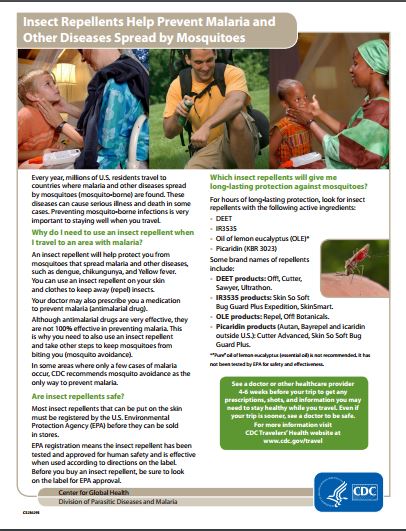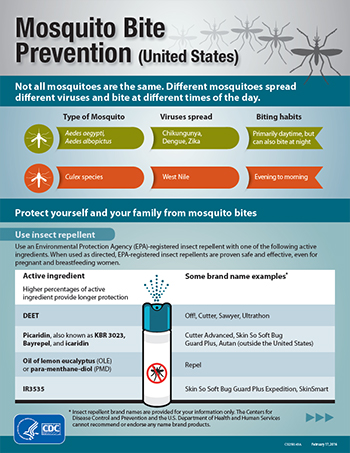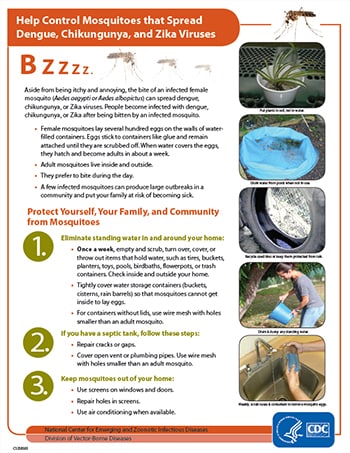Reducing Exposure to Mosquitoes
The best defense against mosquitoes is to eliminate their breeding locations. Less mosquitoes means less bites!
Mosquito Prevention is No Longer Just a Nighttime Activity
- The Asian Tiger Mosquito, which is now prevelant throughout Montgomery County, is active during the middle of the day from May through September.
- Mosquito prevention should be considered throughout the day and night.
Follow These Steps to Prevent Mosquito Bites:
1. Prevent Mosquitoes From Getting in the House
- Have screens on windows and doors. Check for rips or holes and repair where necessary.
-
If possible, use air conditioning over open windows.
2. Wear light-colored clothes that cover as much of the body as possible.
- Wear long pants and sleeves
3. Apply Insect Repellent
- Follow the CDC guidelines for applying Insect Repellent
- Use only an EPA-registered Insect Repellent.
- Use insect repellent. Look for these ingredients:
- DEET
- Picaridin (KBR 3023, Bayrepel, icaridin)
- IR3535
- Oil of lemon eucalyptus (OLE) or para-menthane-diol (PMD)
- Remember to apply sunscreen and then mosquito repellent
- Reapply as directed.
- Treat clothing and gear with permethrin (or buy items pre-treated with permethrin)
The Environmental Protection Agency developed a tool for finding the right insect repellent based on the insect, protection time, active ingredient or other product specific information. Click the button to open the tool in a new window.
Another Option: Utilize Trapping Devices
A way to reduce flying adult mosquitoes around your property is to lure female mosquitoes (only the females bite) into a capture or killing device (i.e. Mosquito Magnet). They work by attracting the mosquito using propane, CO 2 or a similar product.
In some trapping systems, mosquitoes are sucked into a net, while other systems use a sticky surface that mosquitoes stick to when they land. Others use an electric grid to electrocute mosquitoes drawn into contact.
All trapping systems require some level of maintenance, i.e. propane tanks need to be replaced, capture nets need to be emptied, adhesives need to be replaced, and grids require cleaning to ensure they continue to be effective.
Mosquito Prevention Dos and Don'ts
Do:
- Do follow CDC guidelines when applying repellents.
- Do attempt to remove all standing water (mosquito breeding sites) from your property before you utilize larvicides.
- Do follow manufacturer's guidelines should you choose to utilize larvicides in bodies of standing water ON YOUR PROPERTY.
Don't:
- Don't add any type of larvicide or repellent into streams, common bodies of water (such as stormwater ponds), or storm drains. Adding these items would be considered water pollution, and can be harmful to natural wildlife.
French [PDF - 2 pages]
Spanish [PDF – 2 pages]
Portuguese [PDF – 2 pages]
Arabic [PDF - 2 pages]
Tagalog [PDF - 2 pages]
Vietnamese [PDF - 2 pages]
Mandarin [PDF - 2 pages]
Creole [PDF - 2 pages]
Korean [PDF - 2 pages]

Insect Repellents Help Prevent Malaria
and Other Diseases Spread by Mosquitoes
In English [2 pages]
Steps For Protecting Yourself and Your Family From Mosquitoes
English [PDF – 2 pages]French [PDF - 2 pages]
Spanish [PDF – 2 pages]
Portuguese [PDF – 2 pages]
Arabic [PDF - 2 pages]
Tagalog [PDF - 2 pages]
Vietnamese [PDF - 2 pages]
Mandarin [PDF - 2 pages]
Creole [PDF - 2 pages]
Korean [PDF - 2 pages]
Zika & Mosquito Prevention Information from the CDC:


